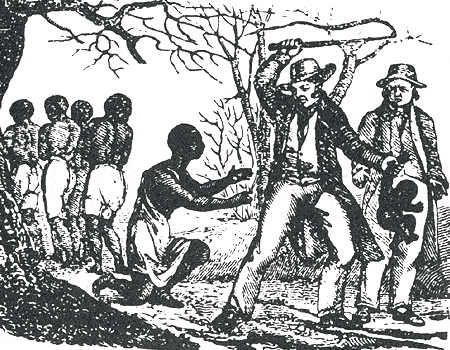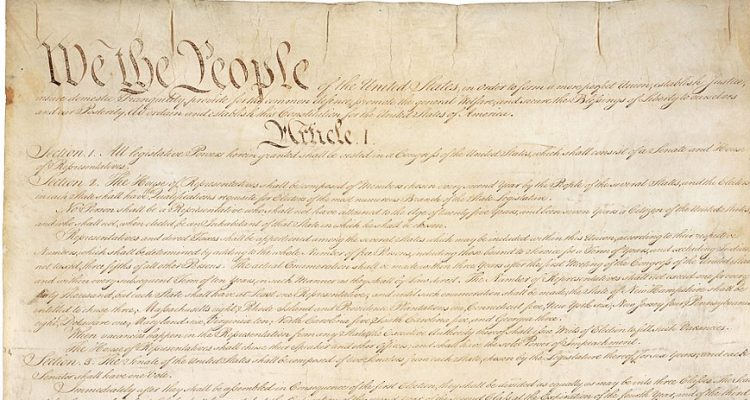It is no surprise that the constitution was written by white men to protect them and the institutions that benefit them. One of those institutions from the jump was slavery.

Ibram X. Kendi, author of the National Book Award-winning Stamped from the Beginning: The Definitive History of Racist Ideas in America (2016), showed exactly how pro-slavery the American constitution actually was from inception. He actually said that the document that governs our country is “enshrined the power of slaveholders and racist ideas in the nation’s founding document.”
Here are ways that the constitution is pro-slavery:
The Three-Fifths Compromise on the Enumeration of Slaves
Despite what is commonly said, the constitution does not reduce Black people to 3/5 of a human, making white people more human than those of African descent. This metric was used during the decade based census to determine taxes and representation in Congress, as a way to equalize Southern and Northern states during the United States Constitutional Convention in 1787.
The Regulation of the International Slave Trade
The constitution allowed for the international slave trade to be exempted from regulation by the federal government. According to the Constitution Center, this clause blocked the federal government from having a say on how many imported “persons” could come into the country in bondage from the ships.
It is interesting to note that in 1787, less than ten years after the nation was born, five of the original 13 states outlawed slavery in various ways: Pennsylvania, Rhode Island, Connecticut, New Hampshire, and Massachusetts. New York and New Jersey followed up by stopping slavery within the next 10 years. In fact, some of the founding fathers (36 out of the 39 framers) actually were opposed to slavery.
Check out these names and see if you live on a block named after them or remember them in history class:
John Adams (second President of the United States), Richard Bassett (Revolutionary War soldier, Governor of Delaware and senior U.S. Senator from Delaware and a man that freed his slaves), Elias Boudinot (U.S. Congressman, Former Secretary of Foreign Affairs), Aaron Burr (Abolitionist, Former Vice President of the United States), Charles Carroll (Signed the Declaration of Independence), Samuel Chase (Jurist);
William Cushing (First Associate Justice of the U.S. Supreme Court), John Dickinson (Congressman from Delaware), William Ellery (signer of the Declaration of Independence), Oliver Ellsworth (drafter of the United States Constitution, Third Chief Justice of the Supreme Court of the United States, United States Senator from Connecticut), William Few (Revolutionary War soldier, Representative of Georgia at the Constitutional Convention, Representative of Georgia at U.S. Senator), Benjamin Franklin (Genius, Diplomat, President of the Pennsylvania Abolition Society);
Elbridge Gerry (Member of the Constitutional Convention, Representative of Massachusetts), Alexander Hamilton (First Secretary of the Treasury, President of the New York Society for Promoting the Manumission of Slaves), Patrick Henry (Statesman, Founding Father), Stephen Hopkins* (Rhode Island Assemblyman, Signer of the Declaration of Independence), John Jay (President of the Continental Congress. First Chief Justice of the Supreme Court, Governor of the State of New York, Founder and president of the New York Society for Promoting the Manumission of Slaves), Thomas Jefferson* (Vice President of the United States and Third President of the United States), Rufus King (Member of the Constitutional Convention, U.S. Congressional Representative and U.S. Senator from Massachusetts);
Henry Laurens (Statesman from South Carolina), James Madison (Fourth President of the United States, American Colonization Society, President), Luther Martin (First Attorney General in the State of Maryland, Member of the Continental Congress, Member of the Federal Convention), George Mason (Virginia Constitutionalist), Gouverneur Morris (Statesman and Diplomat), James Otis (Statesman), Thomas Payne (Statesman);
Edmund Jennings Randolph (Governor of Virginia, Second United States Secretary of State, First United States Attorney General), Dr. Benjamin Rush (Founding Father), Roger Sherman (Signer of the Articles of Association, the Declaration of Independence, the Articles of Confederation, and the Constitution), St. George Tucker (Professor of law at William and Mary University), and James Wilson (Signer of the Declaration of Independence).
Only two or three of them actually owned slaves, even as they were against the institution of slavery in theory. They are noted by *. The most famous of them was Jefferson. Check out what he said regarding the abolition of slavery.
Jefferson wrote:
“The abolition of domestic slavery is the great object of desire in those colonies where it was, unhappily, introduced in their infant state. But previous to the enfranchisement of the slaves we have, it is necessary to exclude all further importations from Africa.”
He further wrote:
“The whole commerce between master and slave is a perpetual exercise of the most boisterous passions, the most unremitting despotism on the one part, and degrading submissions on the other. Our children see this, and learn to imitate it; for man is an imitative animal… The parent storms, the child looks on, catches the lineaments of wrath, puts on the same airs in the circle of smaller slaves, gives a loose to the worst of passions, and thus nursed, educated, and daily exercised in tyranny, cannot but be stamped by it with odious peculiarities.”
